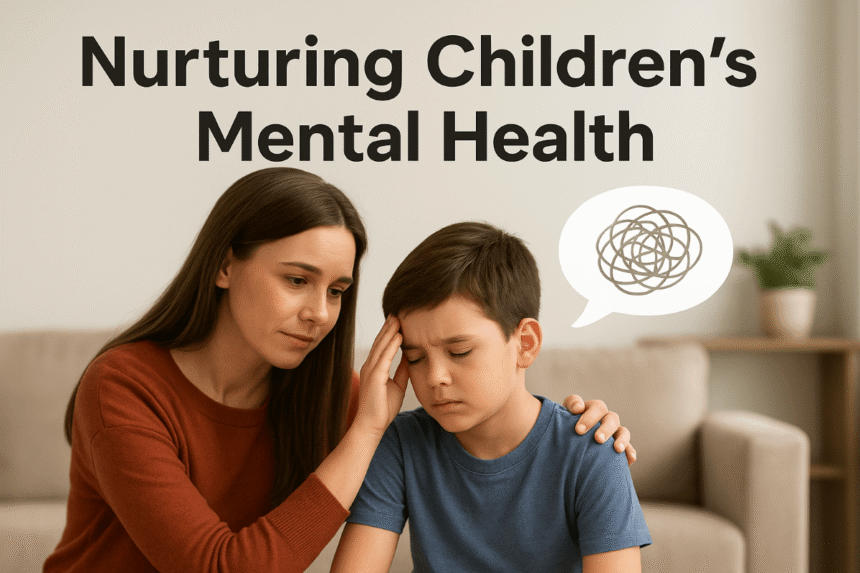Nurturing children’s mental health is one of the greatest gifts a parent can give. In today’s fast-paced and competitive world, children often face emotional challenges that affect their self-esteem and confidence. The way parents respond to these challenges shapes not only their child’s mental well-being but also their emotional intelligence and resilience. A real-life story can show just how powerful compassion and understanding can be in a child’s emotional journey.
Nurturing Children’s Mental Health
In today’s fast-evolving world, children are exposed to various pressures — academic demands, social challenges, digital overload, and at times, even family stress. Amidst all this, their emotional and psychological well-being often gets overlooked. Yet, children’s mental health is the cornerstone of their overall development and long-term success. Understanding its importance and the benefits of nurturing it early on can empower parents, caregivers, and educators to raise emotionally strong and resilient children.
Why Children’s Mental Health Matters?
Children’s mental health forms the bedrock of their overall development. It influences how they think, learn, feel, and interact with others. A mentally healthy child is better equipped to navigate life’s ups and downs, adapt to change, and grow into a confident adult. Without good mental health, even the most talented child may struggle to achieve their full potential. Emotional well-being is just as vital as physical health, and giving it the attention it deserves can make a lifelong difference.
A Heartwarming Story – Nurturing Children’s Mental Health
Meera, a caring mother, noticed that her 8-year-old son Aarav had become unusually quiet. Once full of laughter, he now avoided playing with his friends and often complained of stomach aches before school. Meera’s motherly instincts told her something was wrong. One evening, as she tucked him into bed, she gently asked, “Aarav, is something bothering you?”
Tears filled Aarav’s eyes as he whispered, “Mumma, I feel scared in class. When I answer questions and get them wrong, everyone laughs. I don’t want to go anymore.”
Instead of brushing off his fear, Meera hugged him tightly. “It’s okay to make mistakes, my love,” she said softly. “Even I make mistakes at work. What matters is that you try and learn.” The next day, she spoke to his teacher, who agreed to help Aarav feel more comfortable in class.
At home, Meera began spending a few minutes each evening practising lessons with Aarav—not to correct him but to make learning fun. She celebrated his efforts with small praises like, “I love how you tried that answer.”
Slowly, Aarav started regaining his confidence. Within weeks, his teacher noticed a big change. “Aarav’s participating again,” she said. “He seems much happier.”
This story shows how a parent’s gentle approach can transform fear into confidence. Meera didn’t just help Aarav with studies—she nurtured his emotional well-being, building trust and strength that will guide him through life.
Nurturing Children’s Mental Health – Benefits

1. Improved Self-Esteem
When children are nurtured emotionally, they develop a strong sense of self-worth. Feeling valued and heard helps them build confidence in their abilities and judgment. This self-assurance encourages them to try new things, solve problems independently, and handle mistakes with a positive outlook. A child with healthy self-esteem is more likely to take on challenges, speak up for themselves, and form a strong, resilient identity.
2. Better Emotional Regulation
Mental health support teaches children how to recognize, understand, and manage their emotions in a healthy way. Instead of reacting impulsively or bottling up their feelings, children learn to express themselves constructively. This emotional regulation reduces behavioral problems such as outbursts, aggression, or withdrawal. It also helps them deal with stress, disappointment, and frustration — essential life skills that carry into adulthood.
3. Reduced Risk of Mental Disorders
Addressing emotional needs early on acts as a protective barrier against mental health conditions like anxiety, depression, and behavioral disorders. Preventive mental health care can identify and resolve issues before they escalate. Even when challenges arise, early intervention can significantly lessen their impact, leading to quicker recovery and better long-term outcomes. Simply put, it’s easier to build strong children than to repair broken adults.
4. Positive Social Skills
Children who receive emotional support tend to be more empathetic, cooperative, and understanding. They are better able to form and maintain healthy relationships — both with peers and adults. These social skills foster inclusion, reduce bullying, and create supportive environments where children feel accepted. As they grow, these abilities also benefit them in personal and professional relationships, forming a key part of emotional intelligence.
5. Stronger Family Bonds
When families prioritize mental health, they cultivate open communication, trust, and emotional closeness. Children feel safe expressing their feelings and seeking support when needed. This creates a strong bond between parents and children, fostering a nurturing environment where love, respect, and understanding thrive. In such homes, children grow up feeling secure, valued, and emotionally connected — essential ingredients for a happy childhood.
Tips for Nurturing Children’s Mental Health
1. Understanding the Emotional World of Children
Every child experiences emotions differently. Some express sadness through tears, others through silence or irritability. Parents must observe these subtle cues and create a safe space where children can express themselves freely. Emotional understanding begins when parents listen without judgment and respond with empathy, just as Meera did. Recognising feelings early helps prevent anxiety and boosts mental resilience. Building Emotional Resilience in Children: Why Letting Kids Cry Builds Strength
2. The Power of Listening and Validation
Children need to feel heard and understood. When Aarav shared his fears, Meera validated them instead of dismissing them. Validation tells children, “Your feelings matter.” Simple phrases like “I understand you feel upset” or “That must have been hard” build emotional security. This approach strengthens the parent-child bond and encourages open communication in the future.
3. Building Confidence and Emotional Strength
Confidence grows when children are encouraged to try rather than pressured to be perfect. Praise effort, not just success. For example, saying, “I’m proud of how you worked on that problem,” helps a child value persistence. Avoid comparing siblings or classmates, as this can lead to insecurity. Every child has unique strengths—nurture them through encouragement and patience.
4. Creating a Safe and Supportive Home Environment
A peaceful home atmosphere fosters good mental health. Establish routines that provide predictability—family dinners, storytime, or simple walks together. These moments help children feel connected and secure. Replace harsh criticism with gentle correction. For instance, instead of “You’re careless,” say, “Let’s try again together.” Such phrasing builds confidence rather than fear.
5. Teaching Emotional Regulation by Example
Children learn by observing. If parents remain calm under stress, children naturally adopt emotional control. Meera’s openness about her own fear of making mistakes showed Aarav that it’s normal to feel anxious. Introduce mindfulness techniques like deep breathing or “pause and think” moments to help kids calm down. These small habits teach lifelong emotional management.
Affirmations For Calm Parenting: Nurturing Patience And Peace
6. Encouraging Positive Habits for Mental Health
Activities like outdoor play, creative arts, reading, or journaling help children express emotions constructively. Limiting screen time and prioritising real-life interactions nurtures emotional balance. A family game night or cooking together can strengthen bonds while reducing stress. Encourage gratitude by asking, “What made you smile today?”—a simple practice that shifts focus to positivity.
7. Seeking Professional Help When Needed
Despite best efforts, some children may need extra help. If signs of distress—like persistent sadness, anger, or withdrawal—continue, consulting a child psychologist can be life-changing. Early intervention prevents problems from deepening. Seeking help doesn’t mean failure—it’s a sign of love and responsibility.
Conclusion
Nurturing children’s mental health isn’t about perfection—it’s about presence. When parents offer patience, empathy, and unconditional support, they give their children the emotional tools to face life’s challenges with courage. Meera’s story reminds us that small gestures—listening, hugging, or simply saying, “It’s okay to be scared”—can make a profound difference. Children who grow up emotionally supported become adults who are kind, confident, and resilient.
Raising Emotionally Resilient Kids: A Guide To Helping Children Thrive
How are you nurturing your child’s mental health today to help them grow into a confident and emotionally strong individual?
FAQs – Nurturing Children’s Mental Health
1. Why is nurturing children’s mental health so important?
Because it builds emotional resilience, self-esteem, and the ability to cope with challenges, laying the foundation for lifelong well-being.
2. How can parents recognise emotional struggles in children?
Watch for signs like mood changes, withdrawal, appetite loss, or fear of school—these may indicate underlying anxiety or stress.
3. What can parents do daily to support mental health?
Spend quality time, listen actively, show affection, and maintain predictable routines that make children feel safe.
4. How does storytelling help mental health development?
Stories like Meera and Aarav’s help children relate to emotions, understand empathy, and learn problem-solving through examples.
5. When should parents seek professional support?
If emotional or behavioural issues persist for several weeks or affect daily life, it’s wise to consult a counsellor or child psychologist.
Thank you for taking the time to explore this post. I hope you found it both insightful and enjoyable.
Remember, your sharing can make a positive impact! Please share this post across your social media and other networks, allowing others to gain from its content.
PVM
Read How to prepare your child for a lifetime of positive mental health: 0–5 years
Healthy Mental & Emotional Development

Mathukutty P. V. is the founder of Simply Life Tips, a blogger, content writer, influencer, and YouTuber passionate about learning and sharing. Guided by “Simple Living, Creative Thinking,” he believes in the power of knowledge sharing and lifelong learning.







